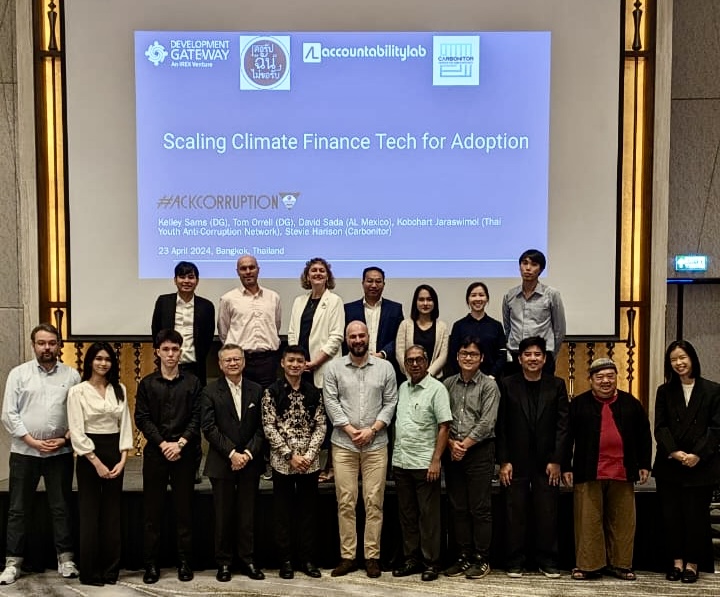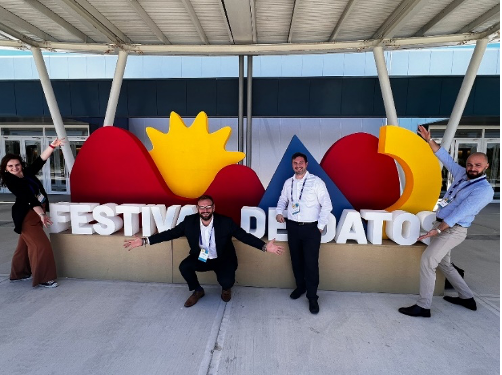Our Vision for Citizen Engagement
Recently in Washington and London, we participated in Citizen Voices, a global conference on citizen engagement for enhanced development impact with the World Bank. At both events, there was much talk about the role of technology in empowering citizen feedback loops to improve development outcomes.
The events allowed us to reflect on our work in transparency, accountability and good governance. We thought especially about how Open Data, data visualization, and innovation spaces can foster more and better citizen participation in the development process – from identifying the issues to designing the solutions.
One Problem is Adoption
As governments become more open they are producing more open data about their activities. Yet open data is just a “gateway drug” toward more participatory governance. We need to focus on the ecosystem that surrounds such tools to get citizens “hooked” on the power of open data to effect the changes that are relevant to their day-to-day challenges.
Development Gateway (DG) is already working to make open data impactful. We are working with 25 countries to manage their development resources with the Aid Management Program. Many of them are working to open their aid data via public portals and geocoding the data so citizens can visualize where resources are (or are not) going. DG is also working with USAID as part of the AidData consortium to geocode and visualize development activities in 17 countries. DG is also integral to the World Bank’s Mapping for Results initiative.
These activities are largely focused on the government “supply-side” of the equation – where the resources are going. While resource data is valuable to citizens and governments, DG plans to do more to make open data more comprehensive and more accessible.
Relevance is the Key
The key to Open Data adoption is relevance and context. What data will citizens find relevant? And how they will use that relevant data to improve their lives?
There are certainly many answers to those questions, and approaches should be tailored to unique communities and cultures. There is no one “right” answer – there needs to be an open and ongoing conversation between citizens, civil society, technologists, and governments to define what is relevant, how to show relevance, and where people can interact around relevant data to achieve development results.
Our Vision
We believe that an informed and engaged citizenry and civil society, using the tools of Open Data, can improve development outcomes in partnership with their governments.
To find out what matters to citizens, civil society, technologists, and governments, we need to bring them together in “safe” public venues where they can identify development challenges and create lasting solutions together face-to-face. For citizens, governments, and civil society, this can be traditional community centers like libraries, schools, universities and places of worship.
For technologists, co-working spaces like the “Hubs” and “Labs” that are emerging around the world are bringing excitement and attention to development challenges. DG took a slightly different approach than others. We reinvented our working environment, opening up our office space and inviting over sixteen other organizations to form the new OpenGov Hub. With almost daily events mixing citizens, governments, and civil society with technologists, we are beginning to see significant increased collaboration and innovation.
Next Steps
The path to our vision will be long and winding, and we are already moving forward. We are improving and expanding Open Data tools, we are building deeper partnerships with OpenGov Hub members, and we plan to scale up the “Hub” concept around the world. Key to our success will be developing the intervention processes and supporting technology tools that will bring engaged citizens, civil society organizations, and responsive governments together to improve development outcomes.
Join us. We can succeed together.
Share This Post
Related from our library

The Future of Technology Governance and Global Development: Why DG Brought DataReady In-house
DG is excited to announce we now have more robust data governance advisory services with the recent integration of DataReady.

Letting the Sunshine in: Building Inclusive, Accountable, and Equitable Climate Finance Ecosystems
In April, DG, HackCorruption, and the Thai Youth Anti-Corruption Network hosted a roundtable in Bangkok to discuss climate financing. This blog explores the main takeaway: a multi-disciplinary and multi-stakeholder approach that prioritizes local contexts, inclusive governance, transparency, accountability, and equitable distribution of resources is essential to impactful climate financing.

Developing Data Systems: Five Issues IREX and DG Explored at Festival de Datos
IREX and Development Gateway: An IREX Venture participated in Festival de Datos from November 7-9, 2023. In this blog, Philip Davidovich, Annie Kilroy, Josh Powell, and Tom Orrell explore five key issues discussed at Festival de Datos on advancing data systems and how IREX and DG are meeting these challenges.